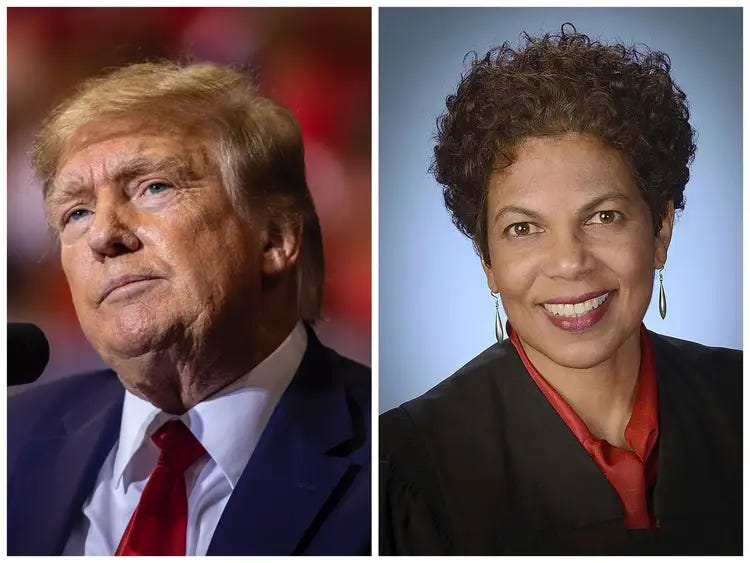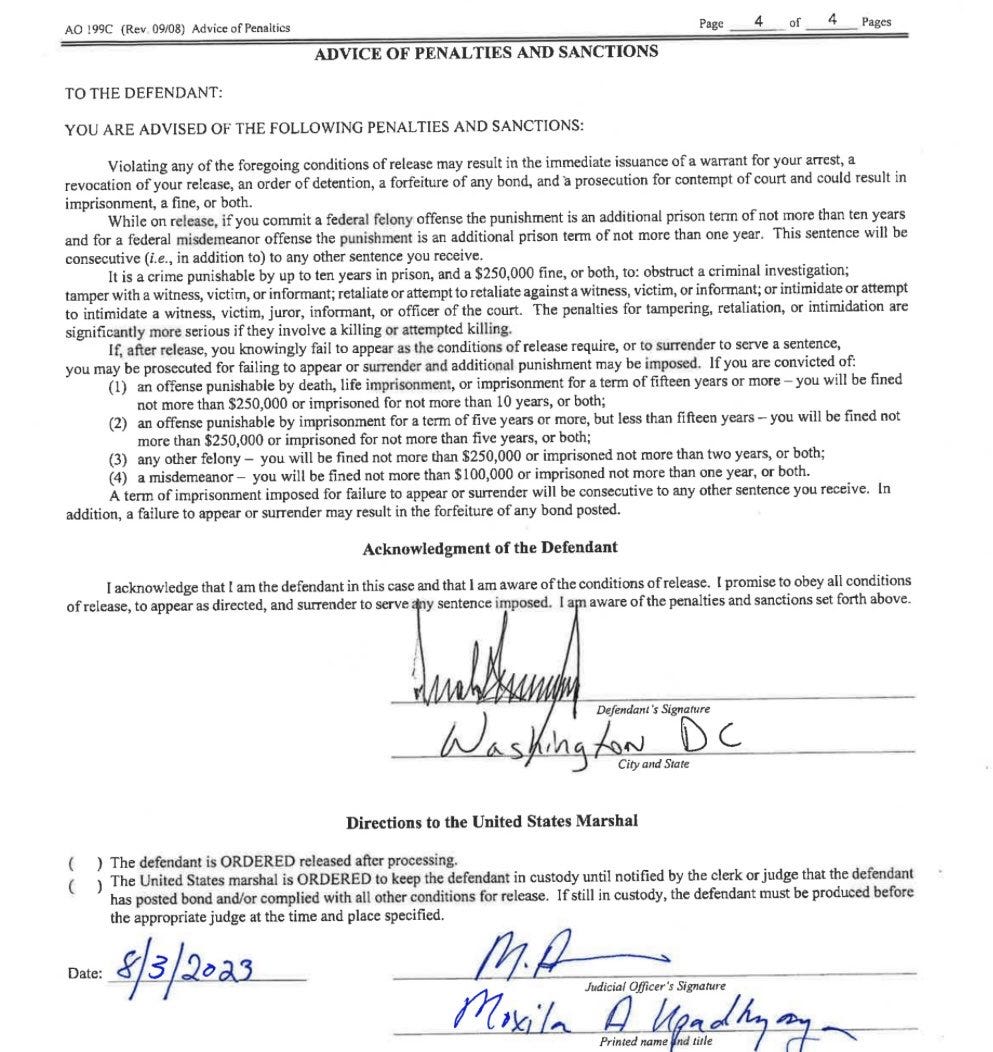
The second federal indictment of Donald J. Trump is only a week old, and already he is fighting for special treatment, trying to reframe the narrative of the case, and even flagrantly violating the terms of his pre-trial release. Those are some high stakes games he is playing, but he doesn’t seem to realize he holds few cards and even fewer chips.
Currently at issue is a proposed Protective Order that would prevent Trump from disclosing publicly or otherwise sharing broadly information and material he receives from the government by way of discovery—including, importantly, transcripts of witness testimony. The government wants a standard protective order that covers witness identities and testimony, while Trump wants a fairly lax one that is easy to circumvent.
Trump has already shown a disturbing propensity to come after witnesses and intimidate them via his social media posts and speeches. As stochastic terrorist-in-chief, Trump knows that his words will inflame certain unstable followers to take action on his behalf against others he targets. It’s why MAGA radicals began to threaten poll workers Ruby Freeman and Shaye Moss. It’s why the insurrectionists called for Mike Pence to be hanged as they stormed the Capitol. Trump is a mob boss with a gigantic megaphone, and he is using it.
That’s one reason a standard, strong protective order is absolutely necessary in this case. Moreover, as the government pointed out in its papers, Trump is trying “to use the discovery process to litigate this case in the media” and shouldn’t be handed more ammunition to do that. As I’ll discuss below, that’s not what the discovery process is for, and Trump shouldn’t be allowed to abuse it.
The next logical question of course is, “How do we stop him?”
The Discovery Process
Criminal discovery gives defendants an opportunity and ability to prepare their defense to the charges. That’s its primary purpose. The process doesn’t exist to grant the defendant some broader right to publicize details of the case outside of court.
That applies especially to information from and identities of key witnesses, which the defendant sometimes only comes to learn of through the discovery process. If there were no limits on what a defendant could do with that information, the justice system would open itself up quickly for abuse. Witnesses might be afraid to come forward if they knew that, once charges were filed, what they said to investigators or even to the grand jury might find its way out to social media or onto papers as a major headline.
Further, if there were no limits on what a defendant could do with discovery, someone like Trump could selectively release information that was favorable to him while holding back everything unfavorable. Prosecutors couldn’t respond to that very easily, assuming they are playing by the book, and it could quickly taint any prospective jury pool.
That’s why it’s so critical for there to be ground rules before prosecutors start turning over sensitive information in discovery, especially to a bully like Trump. And those ground rules usually come in the form of a protective order.
The proposed Protective Orders
It’s pretty rare to see so many fireworks over what is the normal and standard way to proceed with a protective order. Ordinarily, this request is fairly routine, and there are plenty of model protective orders to choose from. In this case, the government wound up submitting what is essentially a template from another January 6 case being overseen by Judge Carl Nichols, who is a Trump-appointee.
Trump and his lawyers decided, however, to turn this mini skirmish into something of a circus over the weekend. Rather than negotiate about the terms and submit a red-lined copy or copies, which would take very little time to do, Trump’s lawyers asked for more time to respond in a brief opposing the proposed order. The judge said nah, you still have till Monday.
Trump’s counsel then filed a 29 page brief in opposition to the proposed Protective Order. If you think that’s a bit weird and excessive, you wouldn’t be wrong. And they took the opportunity to again recast this case as about free speech, when it simply isn’t.
“In a trial about First Amendment rights, the government seeks to restrict First Amendment rights,” Trump’s lawyers wrote. “Worse, it does so against its administration’s primary political opponent, during an election season in which the administration, prominent party members, and media allies have campaigned on the indictment and proliferated its false allegations.”
Unsurprisingly, Trump then asked for all kinds of unusual accommodations in light of his political candidacy, including the right to make public any witness transcripts that were not protected by grand jury secrecy, as well as to expand the number of people who could see and access the material.
That expanded ground included so-called “volunteer lawyers.” If by volunteer, Trump means people who are not really his lawyers and aren’t really getting paid (which is nearly every attorney he knows, once you think about it), that is a wide circle indeed. As the government pointed out in its reply, this could even include his co-conspirators John Eastman, Rudy Giuliani, Jeffrey Clark, Sidney Powell and Kenneth Chesebro.
What Trump really wants
As his opening salvo made clear, a main thrust of Trump’s argument is that the entire case is about silencing his free speech rights. Last week, I wrote about how this is just plain wrong, and how the indictment even makes it clear that this is manifestly not about Trump’s right to speak, or even lie, to the public, but rather about his actions within a criminal conspiracy to overturn the election.
Trump hopes, however, to frame this case as really about efforts to muzzle him. The more successful he is at this, the more sympathy he will gain from his followers, his party, and Republican officials generally. That’s why he is now goading the judge and the prosecutors into possibly seeking a gag order, why he is crossing the line when it comes to not intimidating witnesses or obstructing justice, and why he wants a lax Protective Order so he can continue to say whatever he wants about whomever he wants, even if he learns those things only through the discovery process now that he is an indicted defendant.
In short, Trump is hoping to create a win-win situation for himself. If he prevails on his opposition to the Protective Order, and isn’t hauled before the judge for violating the terms of his pre-trial release or otherwise silenced by a gag order, then he can continue to threaten, cajole, and intimidate witnesses and the officials involved in his case.
If on the other hand he loses on the Protective Order, or he is slapped with sanctions for his speech or even put in jail over it, he can point to this and say, “See? I’m being persecuted for speaking out! This is all part of their effort to silence me and keep me from winning the election!”
How do you solve a problem like Herr Cheeto?
Jack Smith knows better than to run immediately to Judge Chutkan for a broad gag order or a request that Trump be jailed. That would turn the skirmish into an all-out spectacle, would delay the case while the issue is litigated, and allow Trump to set the terms of the debate. No bueno.
Enter Judge Chutkan. She appears to be onto Trump and his ways by pushing the hearing along. She has already ordered the parties to meet and confer and provide two times and dates before August 11 (this Friday) for a hearing on the Protective Order dispute. Specifically, she wants to hear from the parties how the proposed Protective Order would impact Trump’s free speech rights. Importantly, she will have broad authority to control how to enforce the Order she enters if it is ever violated.
One way she could do this is a slow boil. For example, she could put the government’s proposed Protective Order in place, then admonish Trump not to post any more on Truth Social about anything that has to do with potential witnesses or court officials, even if it doesn’t name them or threaten them directly but only indirectly. She could remind Trump that he is out of jail as a privilege, subject to conditions that he agreed to in writing.
Note that the document Trump signed makes clear that it is a crime to intimidate or attempt to intimidate a witness, victim, juror, informant or officer of the court, and that violating the conditions of release (which include not breaking the law) could result in “an immediate issuance of a warrant for your arrest, a revocation of your release, an order of detention, a forfeiture of any bond, and a prosecution for contempt of court.”
Thus, if Trump violates the terms of his pre-trial release, as he apparently has and will continue to do, the judge could begin by deeming his bond forfeit. She could also, for example, order a one week gag order, with no social media posts from him whatsoever.
If he violates her order again, she could haul him in and even put him in jail overnight to ponder his ways. This has a couple bonus features: It would get the public used to the idea of him in jail, and show Trump what it would be like. I have a feeling that he might not like the experience, and it might actually cause him to pull back or even stop his online attacks.
Trump is a bully and a coward, but he may have met his match in Jack Smith and Judge Chutkan. And they hold far more power than he does in shaping how the case will proceed. He is playing a dangerous game by testing the limits of his pre-trial release conditions, especially before Judge Chutkin, whom he has also openly and publicly attacked. Naturally, he will try to remove the case from her, but he almost certainly will fail.
The deeper Trump digs his hole with the judge, the worse it will be for him. I wonder how long it will take him to figure that out.





He will never figure out that his behavior is the cause of his problems. He will keep throwing tantrums until he gets his way. He won't and will wail about the consequences, but he'll never figure out that it's his fault. After 70+ years of conditioning, I don't think that behavior can be modified.
I agree with Toby Koch. My hope is the legal system continues to methodically do what they're doing. Huge amount of respect for Jack Smith. This bs needs to end.